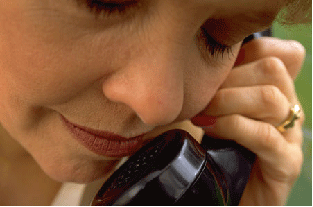|

|

|
The woman on the left had sudden onset of extreme fatigue with dizziness and some mild chest discomfort. Her symptoms would leave but then return. She called her daughter for advice. Her daughter told her to call 9-1-1.
|
Heart disease and heart attacks remain the #1 cause of death in the United States, and the #1 killer of
women (more than all cancers combined). Many of those who die do so because they delay getting care early
after the onset of symptoms; and also because of delays in the diagnosis of heart disease in women.
This latter problem has been attributed to the past impression that
coronary artery disease (the progressive narrowing of the blood vessels
nourishing the heart) is less common in women. In fact, the risk of this form of
heart disease is as great in women as
it is in men, although it may occur at a later age because of some protective
effects of female hormones before menopause.
It has also become obvious that just because coronary heart disease is
less common in women before menopause doesn't mean that it never happens!
Women Are Different
In general, women have had worse results in the diagnosis and treatment of coronary
artery disease. The reasons for this are not yet fully understood.
The way in which women perceive themselves may be a barrier to timely
diagnosis and treatment of heart disease.
Women have historically been the care givers, the keepers of hearth and home.
When illness occurs, women often do not allow themselves the
luxury of being the recipients of care.
Most medical research has been performed on men (for a variety of reasons),
assuming that the results would apply equally to women.
Unfortunately, this has not always been true.
The studies on women and heart disease have produced
disturbing facts. One in nine women(aged 45-64) have some form of cardiovascular disease.
After age 65 the odds climb to one in three.
The situation in black women is worse than among white women.
What makes this more troublesome is that women historically dismiss chest
pain/symptoms as insignificant, or even worse, see heart disease as a
"man's disease". This delays diagnosis and treatment.
When women are finally diagnosed with heart disease they are older and sicker (perhaps with other
diseases). Diagnosis is sometimes delayed because of a reluctance to order tests to confirm heart disease, because
these tests often produce less accurate results in women.
Treatments, such as surgery and angioplasty, are offered less to women
because the results are less successful than in men.
The reasons for this are not clearly understood but are currently being
studied. However, women have been shown to respond better than men to
life style changes, such as smoking cessation, weight control and exercise.
Plan Ahead
Take an active role in your health care.
You are responsible for your health care. You are the best
person to look out for #1.
Choose a physician –
The first and most important preparation is to establish a relationship with a primary care
physician (usually a Family Practitioner or General Internist, although OB/GYN
specialists often fulfill this role for women). You should have an initial evaluation with your
physician when you are well. This allows you
the opportunity to form a partnership with your doctor in your health care
rather than focusing on illness.You should ask your doctor or a member of
his/her staff the following:
-
Does the doctor care for patients in the hospital,or only in the office?
-
At which hospitals does the doctor practice?
-
Does the doctor care for patients with heart problems, or does he/she
refer to a specialist? If the latter, who is the specialist?
-
Can the doctor be reached promptly for emergencies outside of office hours? How?
-
Who "covers" for your doctor when he/she is unavailable?
Know How to Get Emergency Health Care
Know how to access the Emergency Medical Services (EMS) in your community.MOST
communities now use the "9-1-1" telephone
number for emergency calls. Contact your local Police or Fire Department
for information if you do not already know. You should be prepared so that if
you have chest pain, you won't panic, deny or delay. Get emergency care right away.
You should also try to learn about how your hospital deals with
possible heart emergencies. If there is more than one hospital in your community, you may
want to gather information on all of them and compare.
Important questions include:
- Does the hospital specialize in heart disease? This
should be deeper than their "P.R." efforts. Does thehospital provide
services or techniques which are not available at other hospitals in the
community?(Examples: Heart surgery, cardiac catheterization.)
- How does the Emergency Department prioritize patients with chest pain?
(The "standard" is that the patient is evaluated IMMEDIATELY.)
- Are all the Emergency Department physicians certified in Emergency Medicine?
Are the nurses nationally certified in Emergency Nursing?
- Are clot-dissolving medications administered to heart attack victims in
the ED, or only once the patient is admitted to a hospital bed?(Sooner is better!)
Are the ED doctors permitted to give the drugs, or are
they required to wait for a heart specialist to call or arrive?
Collect Personal Health Information
You should carry with you at all times any pertinent information about your
health which may be helpful to health care personnel caring for you.
This list should include:
- Current or previous medical problems
- Medications (names and doses) and include herbal supplements you are taking
- Family members with heart problems, stroke or diabetes
- Medication allergies.
- Some people also carry a wallet-size copy of their electrocardiogram (EKG).
Learn About Clot Dissolving Drugs
Be prepared to help the ED personnel decide whether clot-dissolving drugs
(thrombolytic therapy) should be given to you. In order to do
this, you need some understanding of what the drugs do and what the risks
involved are. Think about these before the need arises!
A heart attack occurs when a blood clot forms in one of the blood vessels
that supplies heart muscle. The muscle may be injured as a result of the blockage.
Modern drugs are often (90% of the time) able to dissolve clots and
lessen or stop a heart attack, if given shortly after the beginning of symptoms.
Since any clot may be affected by these drugs, abnormal bleeding
is the major complication. The risk of treatment is higher in those with recent surgery,
major injuries, or stroke, or a history of bleeding problems. Also,
some people who have received these drugs previously can develop allergies.
The use of thrombolytic drugs will be considered if:
- Symptoms have been present less than 4-6 hours;
- The electrocardiogram ("EKG") shows abnormalities
suggesting a heart attack; and,
- The benefit of
giving the drug is judged greater than the risk.
Fortunately, for most people these drugs are nearly 100 times
more likely to help than to harm.
What to Expect in the Emergency Department
Since time is critical in the treatment of heart problems, many things may happen
in the Emergency Department even before a doctor evaluates you. First, you may be seen by a
"triage" nurse. This person's responsibility is to decide which patients
require immediate care. Generally, people complaining of chest discomfort do not (and should
not!) wait in the reception or registration area.
Once you are placed on a bed, several procedures may happen fairly quickly.
giving you oxygen, placing a small tube into a vein in your arm in order to give you
medications, taking a blood sample, taking an EKG (a "picture" of your
heart's electric activity), and attaching you to a heart rhythm monitor.
A nurse or doctor will ask you questions about the discomfort.
BE AS CLEAR AS YOU CAN WHEN YOU DESCRIBE WHAT YOU ARE FEELING.
After you and your tests have been evaluated, the doctor should
explain to you what type of problem he/she suspects. If you don't
understand what you are being told, ask for an explanation in language you do
understand. If the problem is not
from your heart and is not felt to be dangerous, you will probably be sent home
from the Emergency Department.
BUT, you should expect to stay in the hospital:
- If your pain is from your heart, even if the feeling has gone away;
- If the doctor is
not able to say with confidence that the pain is not from your heart;
- If the doctor can't explain what caused the pain.
If you are told to
go home from the Emergency Department in any of these situations, you should
request that you be evaluated by a cardiologist (heart specialist).
A Word About Insurers
As health care reform progresses, rules for emergency care may be set by your
insurer or health plan. Do you need to have physician approval before using the Emergency
Department for care? What are theexceptions; and how do the rules apply to chest
pain or other chest symptoms? Unfortunately, these types of rules are constantly changing,
and no "blanket" recommendation will suit all situations. Nevertheless, in the presence
of suspicious chest symptoms, we recommend that you GO PROMPTLY TO THE EMERGENCY DEPARTMENT AT
YOUR HOSPITAL. Your health (and perhaps your life) may be at stake!
This page was contributed by Steven A. Samuel, M.D., F.A.A.C. and Joanne R. Samuel, M.S.N.,
R.N., C.S., C.C.R.N. Dr. Samuel is with Trenton Cardiology Associates,
Trenton, NJ.
|

























